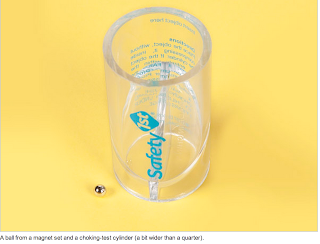The Consumer Product Safety Commission has launched its second assault against companies manufacturing high-powered magnets. On Tuesday, the CPSC filed a lawsuit against Zen Magnets, a Denver-based manufacturer of rare earth magnet desk toys.
Tuesday’s lawsuit mirrors the one the CPSC filed less than two weeks ago against Maxfield & Oberton LLC, makers of Buckyballs. In both suits, the commission voted 3-1 to file the complaint, which asks the manufacturing company to stop selling the product and offer customers full refunds.
“The Commission staff alleges in its complaint that Zen Magnets warning and labeling are defective because they do not effectively communicate the hazard associated with ingestion of the product,” the CPSC statement said. “The complaint further alleges that the product’s design and packaging are also defective because they fail to prevent children from gaining access to the product, and do not allow parents or caregivers to know readily if a magnet is missing and is potentially within the reach of a young child. The complaint alleges that once separated from the packaging, the individual magnets themselves display no warning against ingestion or aspiration, and the small size of the individual magnets precludes the addition of such a warning.”
According to the CPSC, there have been dozens of reported incidents of children and teenagers accidentally swallowing the magnets, which can damage organs and tissues, leading to “infection, sepsis and possibly death.” The CPSC has required that 13 different magnet manufacturers pull their products from shelves, and of those, all agreed except for Maxfield & Oberton and Zen Magnets.
Shihan Qu, founder of Zen Magnets, said that none of the injuries reported involved products from his company and insists, like Maxfield & Oberton, that the items are marketed exclusively toward adults. “Obviously we are being punished because children have regretfully misused our competitor’s magnets, which are similar in size and strength to ours,” he said in a post on the company’s website.
“Of over 2 million sets of Buckyballs sold in the past 3 years, there have been less than two dozen injuries. Buckyballs have always featured an ingestion warning,” Qu said, in defense of Maxfield & Oberton. “Meanwhile, there will be about 100,000 injuries every year in the United States due to backyard trampolines which require Emergency Room treatment, and trampolines are marketed to children. The United States has over 5,000 childhood gun related deaths in a year. 30 American children will die from drowning in Buckets every year. And there have been more skateboard fatalities in 1 year than magnet sphere related injuries in 3.”
Qu said that his company has complied with all labeling requirements as well as “invasive investigations” by the CPSC, save for one where the commission requested contact information for every custom of Zen Magnets. He believes that both his company, as well as his competitors, are being unfairly targeted by overly cautious and reactionary legislation. “Nobody disagrees with the CPSC when a stroller that pinches fingers is recalled, or toys with mechanical defects are recalled, or a coffee pot that burns people is recalled,” he said. “But the current decision makers at the CPSC lack perspective in their current attempts to ban magnets.”
The CPSC’s lawsuits against Maxfield & Oberton and Zen Magnets are the first such stop-sale orders issued in a decade. It is rare for the commission to take legal action against companies directly. Qu has created a petition at www.savemagnets.com, asking the CPSC to retract the stop-sale orders against both manufacturers, as well as requesting that the commission allow the other companies it contacted to resume marketing their products.
“The solution to the dangers of magnets is education, not prohibition,” Qu said. “Even though there have been no ingestion incidents or injuries involving Zen Magnets, we’d love to work with the CPSC to ensure the continued safety of our customers if you have more reasonable requests.”



